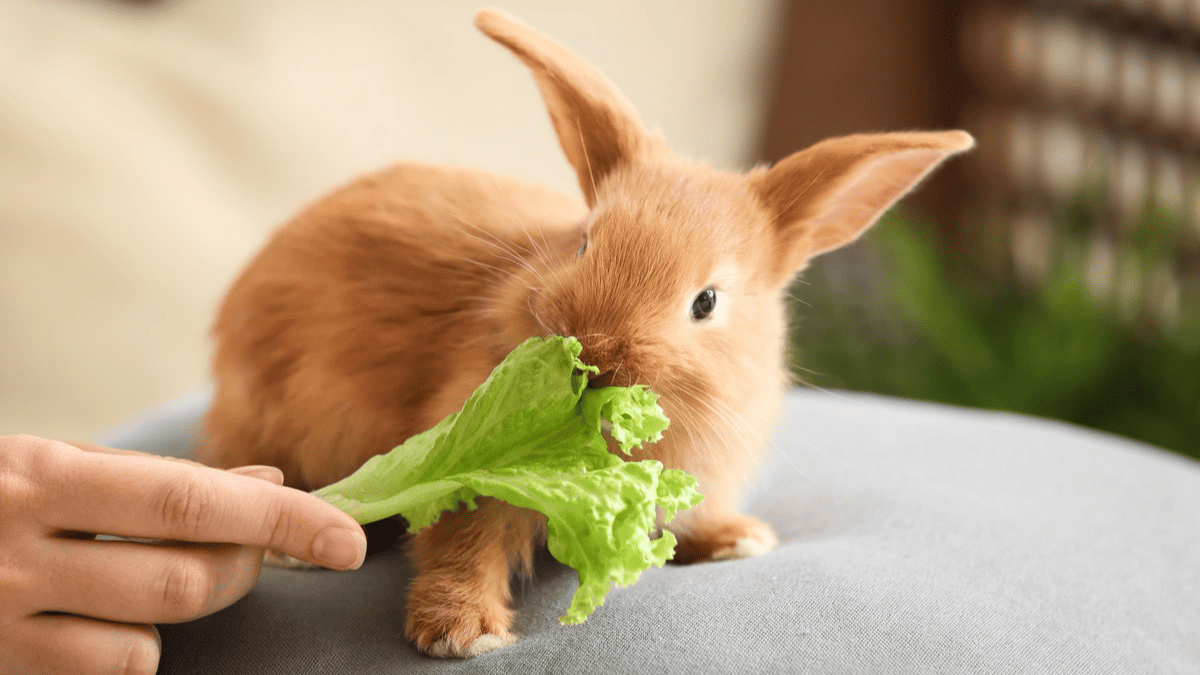Maintaining a proper diet for your bunny is essential to guarantee its health and safety. As pet owners who value the well-being of our furry friends, understanding the best diet for a rabbit becomes crucial.
In this blog post, we will delve into various aspects of maintaining an optimal rabbit diet. We will discuss how to meet your rabbit’s daily nutritional needs by exploring feeding frequency and portion sizes.
Furthermore, we’ll uncover healthy treats that can be offered occasionally while also highlighting some unhealthy options that should be avoided at all costs.
Lastly, we’ll explore alternatives to traditional treats that can still provide enjoyment for your rabbits without compromising their health.
At the conclusion of this post, you’ll have a thorough grasp of what comprises the best diet for a rabbit and how to incorporate it into their care regimen.
Table Of Contents:
- Understanding Rabbit Nutrition Requirements
- Feeding Your Rabbit: Frequency and Portion Control
- Avoiding Unhealthy Treats
- FAQs in Relation to Best Diet for a Rabbit
- Conclusion
Understanding Rabbit Nutrition Requirements
Rabbits have unique nutritional needs that must be met through a balanced diet to ensure their health and happiness.
A proper diet for a rabbit should consist of hay, pellets, vegetables, water, and occasional treats.
Hay: The Fibre Powerhouse
Hay is the most important component of a rabbit’s daily diet, providing essential fibre for maintaining healthy digestion. Rabbits should have unlimited access to fresh hay daily.
The best types of hay for rabbits include:
- Timothy Hay
- Meadow Hay
- Oat hay
- Orchard Grass Hay
Alfalfa hay is suitable for baby rabbits. It has higher protein, calcium, and calories compared to other types of hay, which makes it beneficial for the rapid growth and development of younger rabbits.
However, it is important to note that as rabbits mature and reach around 7 months of age, the calcium content in alfalfa pellets and hay can become excessive, potentially leading to urinary issues.
At that point, it is advisable to transition them to oat hay or grass hays for their long-term diet.
Pellets: The Nutrient Boost
High-quality pellets provide rabbits with additional nutrients they may not receive from hay alone.
Look for pellets that are high in fibre (18% minimum) and low in protein (12-14%).
Fresh Vegetables: The Vitamin Source
Fresh vegetables offer vitamins and minerals crucial to your rabbit’s overall health. Introduce dark leafy fresh greens such as romaine lettuce, kale, parsley, or cilantro gradually into their diets.
Corn including dried corn is not recommended for rabbits as it can be difficult for them to digest and may cause digestive problems or other health issues.
Check out this list for some good vegetable options.
Water: The Hydration Hero
Provide clean water at all times using either a bowl or sipper bottle system; check regularly throughout the day to ensure availability.
Treats: The Occasional Delight
In addition to these main components, occasional treats, like small amounts of fruit or dried herbs can also be offered sparingly (no more than once or twice weekly).
It’s essential to always monitor your rabbit’s dietary intake closely while making any changes slowly over time so that their digestive system can adjust accordingly.
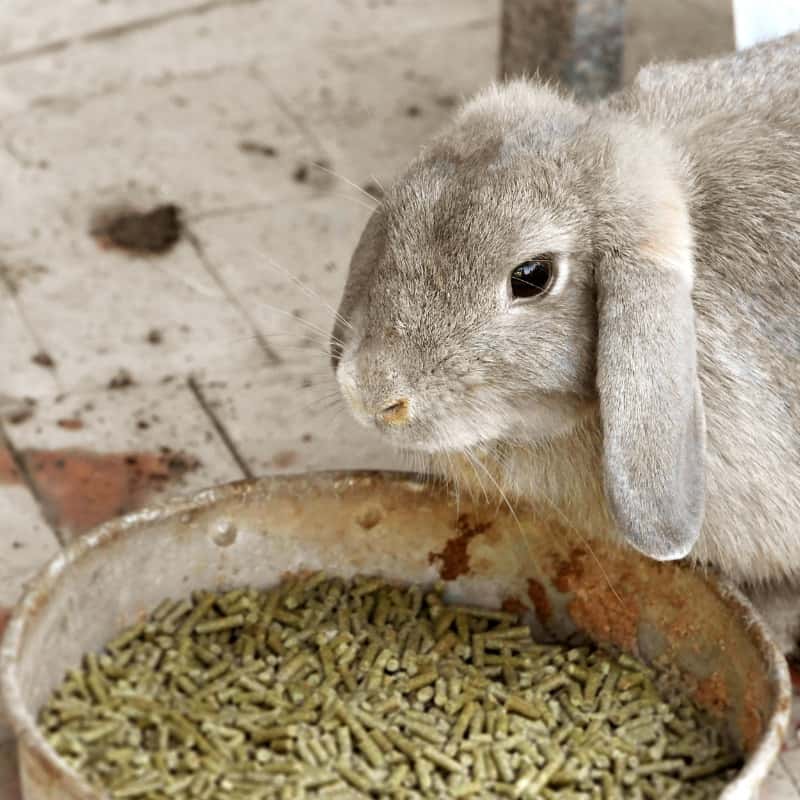
Feeding Your Rabbit: Frequency and Portion Control
Feeding your rabbit the right amount of food is crucial for their health and happiness.
Rabbits possess an idiosyncratic digestive system necessitating them to consume small amounts of food throughout the day. Here’s what you need to know about feeding your rabbit:
Hay: The Staple of Your Rabbit’s Diet
Hay should make up the majority of your rabbit’s diet, around 70-80%. It provides the necessary fibre for healthy digestion and helps wear down their teeth.
It is recommended to provide a bundle of hay approximately the size of your rabbit’s body daily. Make sure to provide fresh hay every day.
Pellets: A Nutritious Addition
Daily, adult rabbits should have a limited quantity of high-quality commercial rabbit pellets – about 1/4 to 1/2 cup of pellets a day- for additional nutritional benefits.
Pellets provide additional nutrients but should not be overfed as they can lead to obesity.
Veggies: A Healthy Treat
Leafy greens such as romaine lettuce, kale, or parsley can be offered every day in moderation, around one cup per average-sized rabbit.
Introduce new vegetables slowly to avoid upsetting your rabbit’s stomach.
Fruits & Treats: A Sweet Indulgence
Fruits like apples or berries can be given sparingly as treats due to their sugar content – no more than one tablespoon daily.
Commercially available rabbit treats should also be fed in moderation according to package instructions.
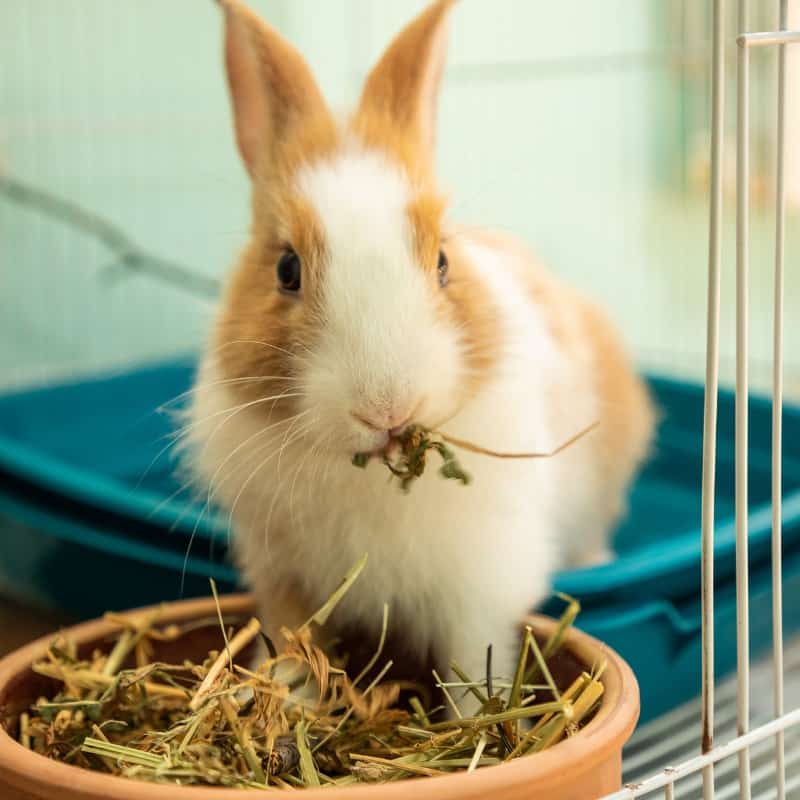
Remember, each rabbit has individual needs, so monitor your rabbit’s weight and adjust their diet accordingly.
Maintaining a consistent feeding schedule is important for your pet’s routine. Consult with a veterinarian experienced in rabbit care if you have concerns about your pet’s dietary needs.
Key Takeaway:
To keep your rabbit healthy and happy, it’s important to feed them the right amount of food. The majority of their diet should consist of hay, with limited quantities of pellets and vegetables offered daily as treats. Fruits should also be given sparingly due to their sugar content.
Healthy Treats For Your Bunny
Bunnies love treats, but it’s important to choose healthy options that won’t upset their sensitive tummies. Moderation is key – too many treats can lead to health issues like obesity.
Some healthy treat options include:
- Fruits: Small amounts of low-sugar fruits like apples (without seeds), blueberries, raspberries, or strawberries make great bunny treats. Remember to remove any pits or seeds before feeding them to your bunny.
- Dried herbs: Parsley, basil, cilantro, dill, and mint are safe and nutritious additions to a bunny’s diet. Sprinkle a small amount over their hay or mix into their commercial rabbit pellets for added flavour.
- Commercially available rabbit treats: Look for high-quality, natural treats made specifically for rabbits. Avoid those with artificial additives or preservatives.
Avoid giving your bunny human foods like bread, crackers, cookies, or cereal as these can be harmful due to high sugar content and lack of nutrients suitable for rabbits.
Make sure your bunny has access to fresh water at all times and an unlimited supply of hay, which is crucial for maintaining good digestion and healthy teeth. This will help keep your bunny happy, healthy, and satisfied.
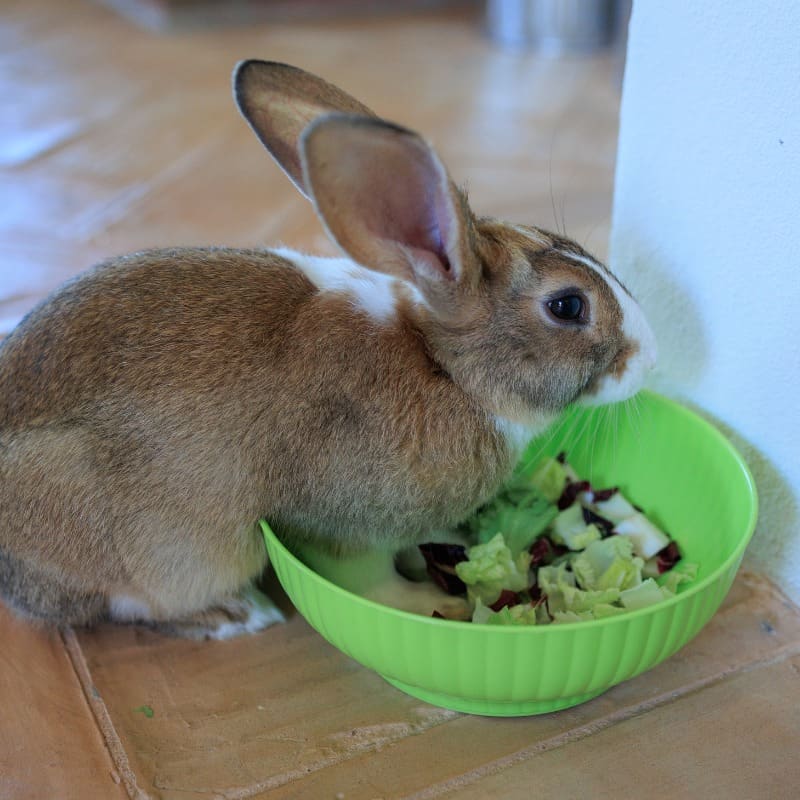
Avoiding Unhealthy Treats
As a conscientious rabbit owner, it is essential to be aware of the potential risks posed by unhealthy treats.
Avoiding treats high in sugar, artificial additives and preservatives is essential for your rabbit’s health. To ensure your bunny stays happy and healthy, you should avoid these types of snacks.
Sugar: Rabbits have a natural sweet tooth, but consuming too much sugar can lead to obesity and dental problems.
High-sugar fruits like bananas or grapes should only be given sparingly as occasional treats. Stick to low-sugar options like leafy fresh greens or small amounts of berries instead.
Artificial Additives: Some store-bought rabbit treats contain artificial colours and flavours that offer no nutritional value and may even cause digestive problems for sensitive bunnies.
Always check the ingredient list before purchasing any treat for your furry friend.
- Avoid products containing artificial colours.
- Select all-natural alternatives made from wholesome ingredients whenever possible.
Preservatives: Chemical preservatives such as BHA or BHT are often used in processed pet foods to extend their shelf life. These additives have been linked to health concerns in animals and should be avoided.
By steering clear of unhealthy treats, you’ll help ensure your rabbit enjoys a long, healthy life. Instead, focus on providing them with nutritious options like fresh veggies and herbs that support their overall well-being.
Don’t let your bunny’s sweet tooth lead them down a path of unhealthy snacking.
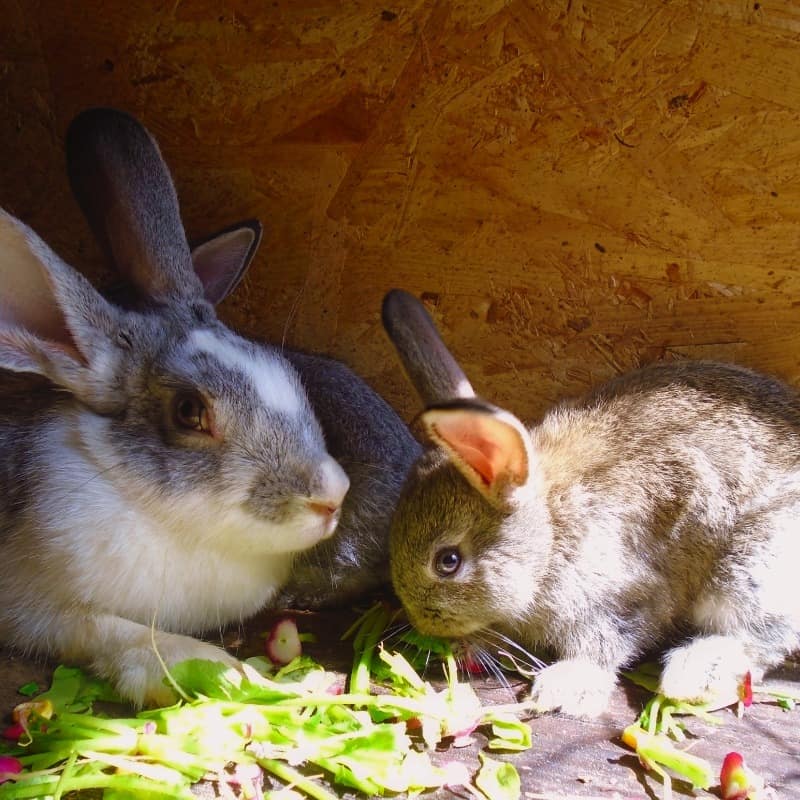
Alternatives to Treats
Don’t rely solely on treats to keep your rabbit happy and healthy. Mix it up with these fun alternatives:
- Interactive Toys: Keep your bunny entertained with puzzle feeders, chew toys, and tunnels that promote natural behaviors like digging and exploring.
- Mental Stimulation Activities: Challenge your rabbit’s problem-solving skills by hiding their food or using treat-dispensing toys that require effort before releasing the reward.
- Social Interaction: Give your social bunny plenty of playtime outside their enclosure to bond with you and get exercise.
- Natural Foraging Opportunities: Encourage foraging behaviour by scattering hay or offering fresh, pesticide-free grasses like dandelion leaves. This promotes dental health through constant chewing.
- Habitat Enrichment: Provide hiding spots within their enclosure using cardboard boxes or wooden hideouts to give your rabbit a sense of security and exploration opportunities.
FAQs In Relation To Best Diet For A Rabbit
What’s The Healthiest Diet For A Bunny?
The healthiest diet for a rabbit consists of 70-80% hay, 10-20% fresh veggies, and 5-10% high-quality pellets, with occasional fruit treats and clean water always available. Learn more about rabbit diets here.
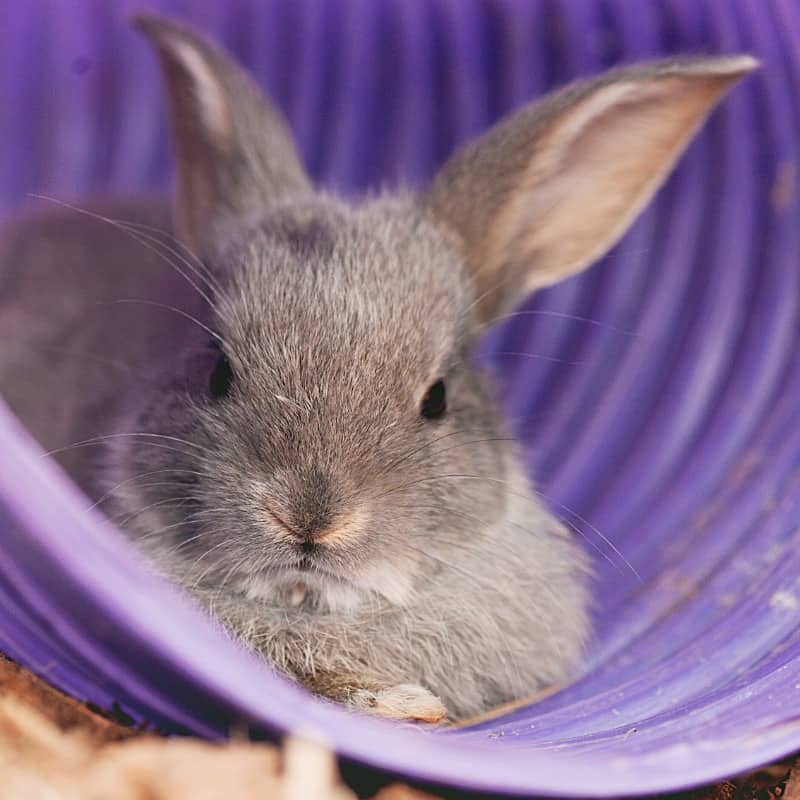
What Nutrients Does A Rabbit Need In Its Diet?
Rabbits need fibre, protein, vitamins (especially A and D), minerals (like calcium and phosphorus), and water to stay healthy.
Should I Put My Rabbit On A Diet?
Only put your rabbit on a diet if advised by a vet due to obesity or other health issues, and make gradual changes while monitoring progress.
What Should Rabbits Eat?
The best diet for a rabbit includes unlimited fresh hay for your rabbit’s daily diet, along with appropriate portions of veggies and pellets based on age, size, and activity level, and monitor consumption habits closely.
Learn more about what rabbit’s should eat here.
Conclusion
Overall, the best diet for a rabbit is one that consists of hay, vegetables, and high-quality pellets.
Understanding their nutritional requirements and feeding them appropriately can help prevent health issues such as obesity or dental problems.
It’s important to avoid unhealthy treats and instead opt for healthy alternatives like herbs or leafy greens.
By adhering to the dietary advice for your pet rabbit, you can guarantee they receive all of their essential nutrients while maintaining a state of contentment and well-being.
Advice from a vet should be sought if questions arise regarding the dietary needs or health of your rabbit.
Read More
See all our Rabbit Guides and Information here.



